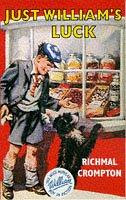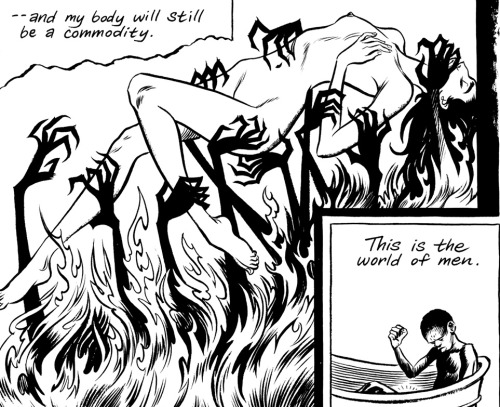Habibi - Craig Thompson
'the Divine Pen'
I love it when a publisher says 'Do you know what, this book is beautiful, we should make sure it looks really beautiful.' The pleasure from Craig Thompson's latest graphic novel comes as soon as you pick it up. In fact it comes even before you do that. A soon as you see its beautifully designed cover the old pleasure receptors start firing and once it's in your hand then you can add a sense of import to the pleasure. It's fitting that this book, which I was aware drew on stories from both the Qur'an and Bible, has a biblical heft to it. Over 650 pages are contained within the intricately detailed, embossed and foiled cover and holding a book of that size feels very significant. A quick glance at the pages within and you can see you're in for a treat. This is a big, bold and ambitious book about love, religion, storytelling and mythology and it contains the very best and the very worst of human behaviour. Arabic calligraphy combines with religious symbols, spiritual visions with nightmares, opulent harems with pollution-choked slums. The novel manages to be ancient and modern at the same time so that the primacy of storytelling comes to the fore. We feel for most of the book as if we are reading an ancient story of slavery and redemption until the latter stages when the modern world intrudes making its themes suddenly very contemporary.
In a land choked by drought nine-year old Dodola is sold into marriage by her parents. Her husband is a scribe who teaches her to read and write and through his work she learns 'the Sacred Qur'an and the hadiths, One Thousand and One Nights, and the woks of the great poets.'
These amazingly detailed panels at the beginning with their decorative frames are gorgeous but the idyll they describe and come from is rudely interrupted when her husband is murdered and she is abducted. About to be sold for the second time in her short life, this time into slavery, Dodola manages to escape with an apparently abandoned baby boy, Cham. The two of them make a home for themselves on an old boat 'afloat on an ocean of sand' in the desert and when Cham finds a small spring of water Dodola renames him Zam after the well of Zamzam found by Ishmael, son of Abraham. This change of name is symbolic for Cham, named after the third son of Noah who was born black and later cursed, and represents freedom as much as their escape into the desert. Dodola becomes mother, sister and teacher to him, passing on her own knowledge of writing and storytelling to her eager young pupil (whom she calls Habibi or beloved one). His discovery of a source of water is also as significant as that created by the kicking feet of young Ishmael. Water is incredibly important in this novel as a source of life, salvation and power.
The two of them manage a relatively safe and isolated existence in the desert, Zam protected from the knowledge that their supplies come from Dodola's visits to the travelling caravans and the exchange of her body for food. In fact it isn't the outside world that threatens to ruin their solace but the natural changes that come from within as they grow older and in particular as Zam nears adolescence. Having always been able to share both bed and bath, Zam's quite natural burgeoning desires threaten the safe roles they have been assigned. When he is 12 he becomes aware of what Dodola has been doing to keep the two of them fed all these years. His anger at the sexual violence of other men and his guilt about his own desires lead him to undertake the journey out of the desert to find supplies in her stead. When he returns, Dodola has been abducted once again and the two of them will remain apart for many more years.
Separated from one another each undergoes their own extraordinary and physically torturous journey. Dodola becomes part of a Sultan's harem, prized as the 'phantom courtesan of the desert', challenged to satisfy the famously fickle Sultan for 70 nights in a row to earn her freedom and, after she only just fails to do that, later to turn a jug of water into gold for the same prize. This latter challenge is a fabulous set-piece in which Dodola draws on her learning and ability to read at first and her cunning and guile when she is frustrated. Zam in the meantime is forced to leave the desert when starvation threatens his survival and falls in with a group of eunuchs in the city. It is amongst them that he is introduced to the idea that he might be able to purify himself of the thoughts that he sees as responsible for driving them apart.
I don't think it's a spoiler to say that the two of them will be reunited (the cover illustrations show them older together) but I won't specify exactly how or what happens then. What is important is that these two 'orphans' who looked after one another in a world of scarce resources find themselves just as much at the mercy of them when they emerge into the thoroughly modern looking environment of the novel's final third. Water, which has always been precious, is now bottled as a commodity, its discarded plastic containers contributing to the waste and pollution that chokes the natural waterways. In fact there is a huge environmental message underneath this tale and panels which echo those created by Nick Hayes for his book, The Rime Of The Modern Mariner, which carried a similar warning. Thompson shows throughout the novel how humans exert power over each other by controlling those resources and how men in particular can exert their power over women. What chance is there for the meek in a world like that? Zam and Dodola are allowed a measure salvation but only after having paid a huge price personally. The reader is left exhausted and exhilarated by such an arduous journey, a witness to all the suffering who cannot help but be uplifted by the glimmer of hope offered in the closing pages.
Many graphic novels feel like well-realised shorts. By being pictorial the number of pages shrinks in reading time so that even some of the better ones can still feel a little slight. Habibi is epic in every sense. A big book, yes, but also a grand one with ambition, range and detail to make it a satisfying read from cover to cover and a treasure trove to delve into afterwards. Some of the larger panels have enough detail to keep the eye happy for minutes at a time, the manner in which Thompson threads themes and combines stories is quite brilliant and the structure of the novel as a whole is immensely satisfying, eschewing a straightforward linear trajectory for one that moves backwards and forwards in history just as memory does. If Christmas hadn't already passed then I'd be recommending this as a brilliant gift. There's nothing to stop you getting it as a gift for yourself of course...











3 comments:
I thought 'Blankets' was incredible Will, a brilliant graphic novel (a genre I was down on until I read that particular book actually) indeed.
I was instantly interested in 'Habibi' but I saw it discussed on The Review Show and it got attacked for its depiction of women and rape which has really put me off.
I am now in two minds.
Well, I'm intrigued by that criticism, what did they say exactly? Dodola is the only woman who gets depicted in any great detail. Her whole life is defined by her physical state: sold as an object whilst still a child, traded as a commodity, using her body to survive then imprisoned because of it, using it to attempt to free herself but then having to use her mind, and the central relationship in her life totally subverted from the normal expectations of male and female relationships. In a brutal world of rape, murder and sin she endures terrible trials (as does the male character) and transcends them. I'm interested to know what they didn't like.....
As a background, I've followed Craig Thompson's career for the last 10 years, particularly "Good-bye, Chunky Rice" (which I really liked) and "Blankets" (which I loved and easily consider one of the best novels, graphic or otherwise, ever written). So I was eager to get my hands on Thompson's latest.
Post a Comment